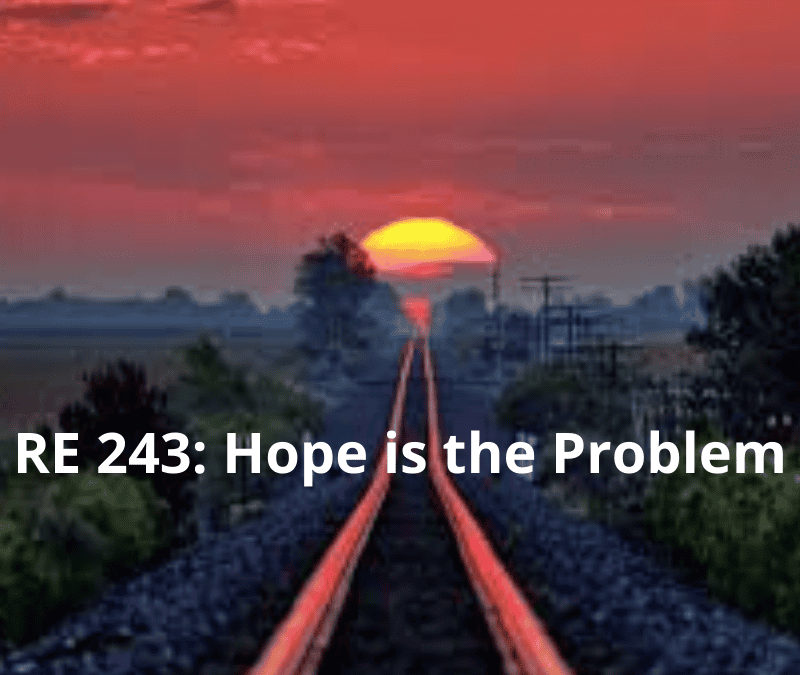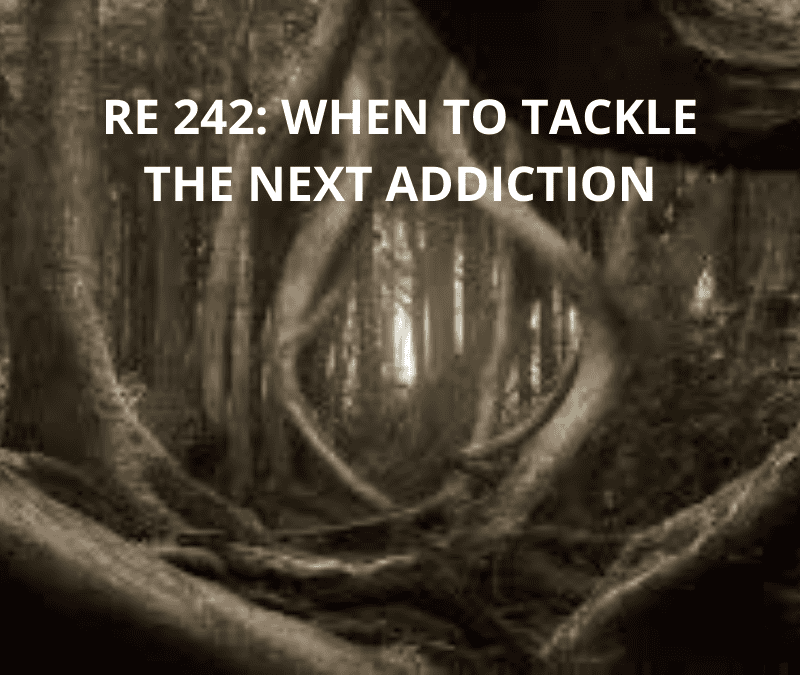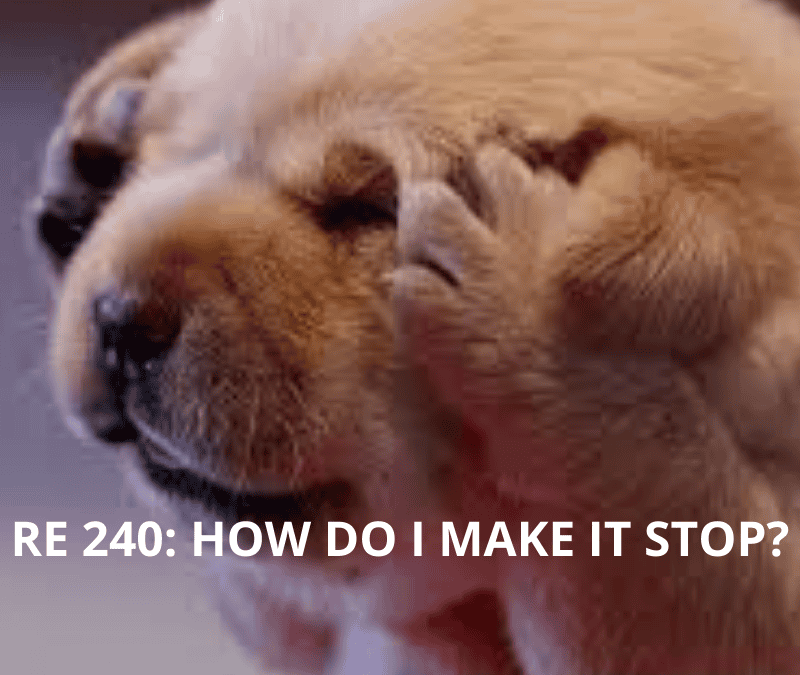
by Paul Churchill | Oct 14, 2019 | Podcast
Podcast: Play in new window | Download
Subscribe to the Recovery Elevator Podcast Apple Podcasts | | More
Patty took her last drink on July 19, 2017. This is her story.
Update on the Alcohol is Sh!t book! The book is out! Pick up your paperback copy on Amazon here! You can get the Audible version here!
On today’s episode Paul talks about the two main sources of unhappiness and how hope is sending us barreling off a cliff. On the surface hope is great. But where is it located on a timeline? In the future, not in the now.
If hope isn’t serving us, then what? Throttle back on the hope and lean into ‘this moment’.
SHOW NOTES
[12:00] Paul introduces Patty.
Patty is 665 years old and is originally from Fairbanks, AK. She currently lives in Corvallis, OR. Patty has 3 children in their forties and 7 grandkids. She worked at a university for 30 years and is now retired. For fun Patty likes to hike, kayak, and sailing.
[13:55] Give us a background on your drinking.
Patty says she was 14 years od the first time she got drunk, and that she was a black-out drinker her very first time. It wasn’t until she was in her 30’s that she felt she may have a problem; it was then she started to drink at home alone.
When Patty was in her forties, she started to attempt to give up alcohol. She would go a couple days up to 11 months, and that went on for about 15 years.
[18:15] Was there a moment that it got scary for you?
In early 2017 she drove home drunk from the airport and realized the next morning how dangerous that was. She says it scared her, that she could have killed someone, or herself.
[20:50] How did you do it those first couple weeks?
Patty said she had a different mindset this time. This time her mindset was one of, ‘I don’t have to do this (drink) anymore’, rather than, ‘I can’t do this anymore.’
[26:00] What are some improvements in life that you have experienced in a life without alcohol?
Patty says she used to make a lot of plans and then not follow through with them, she doesn’t do that anymore. She has signed up to get her pilot’s license, something that she has always wanted to do. Going to the RE Bozeman retreat. She has been a lot more physically active, instead of talking about walking the dog, she just gets up and goes.
[30:25] What is something that you’ve had to go through in the last 2 years that you didn’t expect?
Patty’s mom died 3 months ago and drinking didn’t even seem like an option. It was a real tough time, losing her mom and with family drama, but she was able to be present and she didn’t have conversations that she regretted later.
[37:20] What’s the biggest thing you’ve learned about yourself in these last 2 years?
Patty says it’s that she in genuinely a happy person.
[38:00] Was there a rock-bottom moment?
The drive home from the Eugene airport. Also, on July 19 drinking with her daughter, who herself was struggling with alcohol, and her 16-year-old granddaughter.
[43:00] Rapid Fire Round
- What’s a lightbulb moment you’ve had on this journey?
That I don’t have to drink.
- What is a memorable moment that a life without alcohol has provided you?
Waking up early, I have just started taking a morning Pilates class.
- What is your favorite alcohol-free drink?
LaCroix, hands down.
- What is on your bucket list in an alcohol-free life?
I hope to live in Panama half of the year, and I’m working on that.
- What are some of your favorite resources in recovery?
Definitely Café RE, and I’m a reader so I have every self-help book probably written since 1972.
- And what parting piece of guidance can you give to listeners?
Think it all the way through, and remember you just don’t have to drink.
- You might have a drinking problem if…
You consider dropping $100 at every airport bar as just part of your traveling expense.
Upcoming retreats:
Asia Adventure – January 20-31, 2020
You can find more information about this event here
Resources mentioned in this episode:
ZipRecruiter
This episode is brought to you in support by ZipRecruiter. Right now, my listeners can try ZipRecruiter for free. Visit Ziprecruiter.com/elevator
Connect with Cafe RE– Use the promo code OPPORTUNITY for your first month free
Sobriety Tracker iTunes
Sobriety Tracker Android
Sober Selfies! – Send your Sober Selfie and your Success Story to info@recoveryelevator.com
“Recovery Elevator – We can do this.”

by Paul Churchill | Oct 7, 2019 | Podcast
Podcast: Play in new window | Download
Subscribe to the Recovery Elevator Podcast Apple Podcasts | | More
Kelly took her last drink on October 27, 2017. This is her story.
Update on the Alcohol is Sh!t book! The book is out! Pick up your paperback copy on Amazon here! You can get the Audible version here!
On today’s episode Paul talks about his idea of opening an in person, wellness retreat center in Costa Rica. And while he has been working to create space for this idea and concept, and believes that the body is on board, there is still some discomfort getting out of his comfort zone.
The fact is, we all have rough days, including Paul. He says it’s important to give the body permission to feel the feelings, and also to give the body permission to allow them to go.
If this retreat center is something you’d be interested in attending email Paul at info@recoveryelevator.com .
Paul also addresses the question of, when do you know it’s a good time, after quitting alcohol, to start tackling other substances, behaviors, thought patterns, etc.? Paul’s advice is to go slow and to be patient, your body will know when it is time.
SHOW NOTES
[15:15] Paul introduces Kelly.
Kelly is 54 years old. She is married and has 2 adult children. Kelly is a full-time social worker at a hospital, and she speaks Spanish. For fun Kelly would like to get back into collecting vintage clothing. She likes to read and is looking forward to getting into outdoor activities.
[19:30] Give us a background on your drinking.
Kelly started drinking in 9th grade, just your average high school drinker. By her 2nd year of high school she feels she was drinking more regularly. She didn’t think she has a problem with alcohol because she wasn’t like her father. In 1987 she moved, thinking that that would fix any drinking issues she had.
[31:05] What happened right before you quit drinking?
There were a lot of stresses going on. She was constantly afraid of being pulled over to started to us LYFT. There was a lot of risk taking. She started buying bigger bottles.
Her son started to go to meetings for his own addictions. One nigh he told Kelly he didn’t feel it was safe for him to live at home, because of her drinking. That was the last night she drank.
[39:15] Talk to us about how you are embracing AA and the other side?
For the first 18 months Kelly was only doing AA. But she was also reading a ton of books by/or about women alcoholics. She says the AA meeting have been helpful but that she is bothered by some of the steps.
[53:00] Rapid Fire Round
- What’s a lightbulb moment you’ve had on this journey?
That I am as strong as I am.
- What is your favorite alcohol-free drink?
I like kombucha, and I like coffee.
- What are some of your favorite resources in recovery?
I like Russel Brands’ Recovery on CD. I listen to him in the car. AA meetings, I do like 3-4 a week, and the Big Book.
- What is on your bucket list in an alcohol-free life?
Eventually liking the outdoors. Getting outside more.
- And what parting piece of guidance can you give to listeners?
Listen to any voice inside that is telling you that something is wrong.
- You might have a drinking problem if…
You are 23-year-old woman that has gout.
Upcoming retreats:
Asia Adventure – January 20-31, 2020
You can find more information about this event here
Resources mentioned in this episode:
Honey
This episode is brought to you by the smart shopping assistant Honey. Get Honey for free at www.joinhoney.com/elevator . Honey, the smart shopping assistant that saves you time and money when you’re shopping online
Connect with Cafe RE– Use the promo code OPPORTUNITY for your first month free
Sobriety Tracker iTunes
Sobriety Tracker Android
Sober Selfies! – Send your Sober Selfie and your Success Story to info@recoveryelevator.com
“Recovery Elevator – We took the elevator down, we have to take the stairs back up.”

by Paul Churchill | Sep 30, 2019 | Podcast
Podcast: Play in new window | Download
Subscribe to the Recovery Elevator Podcast Apple Podcasts | | More
Dan took his last drink on July 28, 2018. This is his story.
Update on the Alcohol is Sh!t book! The book is out! Pick up your paperback copy on Amazon here! You can get the Audible version here!
On today’s episode Paul talks about how we need to read his book, and others like it, with pride. We have to shred the shame and ditch the stigma.
He shares a letter he received from someone that attended the Recovery Elevator Retreat in Bozeman recently, and as she was reading Alcohol is Sh!t on the plane the lady sitting next to her asked about the book. And she was able to share. Turned out the lady was on her way to help her daughter who had relapsed and needed to hear everything she had to say.
SHOW NOTES
[10:10] Paul introduces Dan.
Dan is a father of 3, has a daughter in college and the youngest is 14. He works as a retail executive. He lives in New York and enjoys cycling.
[12:45] Give us a background on your drinking.
Dan says he started drinking in high school and drank all through college. He says that drinking is a big part of the business world and he fell right into that. He didn’t realize he had an issue, but his wife did. He said he was drinking 5-6 drinks a night.
[15:35] Talk to us about how you asked yourself, “how can I quit?”.
Dan says he called a hypnotist to get some help, but after his initial call to her he never followed up. About a month later, on July 29, 2018, he was in a bad bicycle accident. His doctors took great care of him and he hasn’t had a drink since.
[18:10] What happened after the accident?
He had a bad brain injury so was told that he should not drink, if he did, he could have a seizure or a stroke. After 10 days Dan came home from the hospital only to find out that his wife had removed all the alcohol from the house. Dan says that was like being asleep and thrown into an ice-cold pool. His brother told him he needed to go to AA so he walked into one only to feel like he didn’t belong. He left that meeting angry and determined to show everyone wrong.
[24:05] How are you feeling now?
Dan says it’s a little bit of ‘he’s going to show them (his friends and family)’ and it’s a little bit of he likes the way he feels and he looks.
[26:47] You were told by your doctor not to drink for a year, because of the chance for a stroke…did you ever have the thought when that year was up to pick up a drink?
Dan says no, in fact he went to the conference he was supposed to be at the year before and never thought about it.
[28:17] At your yearly physical you asked your doctor if you could now have a glass of wine, and he asked you, “why would you?”, can you answer that question?
Dan says because of the social aspect, he admits to missing it.
[39:20] Dan talk to us about that connected feeling.
Dan is feeling connected to life and not the alcohol. He is feeling more connected to his family.
[40:25] What’s on your bucket list for an alcohol-free life?
Going to a sporting event AF and seeing what that’s like and racing again.
[43:00] Rapid Fire Round
- What’s a lightbulb moment you’ve had on this journey?
When I was at my physical and I asked my doctor if I could have a glass of wine and he leaned across the table and asked, “why the F would you?”.
- What’s a memorable moment a life without alcohol has given you?
A better connection with my children and my wife.
- What is your favorite poison free drink?
Diet Coke, I drink too much of it. I also like a nice latte.
- What are some of your favorite resources in recovery?
My favorite resources would be my family, cycling, I have a lot of resources at work too.
- And what parting piece of guidance can you give to listeners?
It’s not all about work, life is a balance, and the more pressure you’re under you need a release and a hobby.
- You might have a drinking problem if…
You’re a business person that the alcohol is incorporated into the fabric of your life.
Upcoming retreats:
Asia Adventure – January 20-31, 2020
You can find more information about this event here
Resources mentioned in this episode:
ZipRecruiter
This episode is brought to you in support by ZipRecruiter. Right now, my listeners can try ZipRecruiter for free. Visit Ziprecruiter.com/elevator
Connect with Cafe RE– Use the promo code OPPORTUNITY for your first month free
Sobriety Tracker iTunes
Sobriety Tracker Android
Sober Selfies! – Send your Sober Selfie and your Success Story to info@recoveryelevator.com
“Recovery Elevator – It all starts from the inside out.”

by Paul Churchill | Sep 23, 2019 | Podcast
Podcast: Play in new window | Download
Subscribe to the Recovery Elevator Podcast Apple Podcasts | | More
Rose took her last drink on March 12, 2019. This is her story.
Update on the Alcohol is Sh!t book! The book is out! Pick up your copy on Amazon here!
On today’s episode Paul talks about Recovery Elevator Bozeman Retreat that took place this past August. One of the speakers at the retreat was a spiritual teacher that Paul has worked with, Elaine Huang, you can find out more about her here.
And a BIG thank you to the sponsors of the retreat.
Nutzo, an organic 7-nut seed butter, that provided a jar of said butter to everyone that attended!
Rise Brewing Co., provided Nitro Cold Brewed Coffee!
Fire Brew, an apple cider-based health tonic, provided shots for everyone!
And tajín, a seasoning blend of lime, chili peppers and sea salt, provided a bottle of zing for all!
The cool thing is that these sponsors wanted to be a part of this event. Thank you to Odette who worked hard in setting it all up!
SHOW NOTES
[22:20] Paul introduces Rose.
Rose is 37 years old. She is from New Zealand but is currently living in France. Rose is a physiotherapist by trade, but her degree is not recognized yet in France so she is teaching English. She is a newlywed and they have a 3-year-old son. For fun Rose likes to cook, sing, be outdoors, and go to gigs.
[25:20] Give us a background on your drinking.
Rose started drinking as a teenager. She says she grew up in a loving family but that everyone was a boozer, that it was normal. At 18 she went off to university but dropped out after 2 years because it was getting in the way of her drinking. She moved cities in search of new drinking friends and for the next 5 years was in an abusive relationship. Rose says she spent a good chunk of her 20’s getting out of, and recovering from, that relationship.
Rose then spent time on a friend’s large sailing boat and sailed to Fiji, continuing her drinking. She then went home and started studying to become a physiotherapist. Rose says she slowed her drinking down while she was studying.
[28:25] What happens next?
Rose got her degree, got a great job in a hospital where she wanted to work. In 2016 she had her son. She says after the birth of her son she fell into the ‘mommy drinking’ culture. Rose also started to feel like an imposter. Promoting health at work but doing the very opposite personally.
[32:20] Was there anything in particular that led you to ditch the booze?
Rose says a big part of it was moving to France in 2017. She found France’s drinking culture to be the polar opposite of New Zealand’s which made her feel out of place. Even though she knew she needed to stop her drinking ramped up at the beginning of this year after the death of a close friend.
[35:15] What happened on March 12th?
Rose says she had started to drink during the daytime, when she wasn’t on pick-up duty with her son. She also started smoking cigarettes. She started feeling guilty about not being present as a parent. She reached out to an American friend she had met on that sailing ship that was posting about being sober. This friend led her to Café RE.
[38:50] How did you do it?
Rose says she told her husband, creating some accountability. Her husband was very supportive. The removed all the alcohol from the house and Rose declined engagements for a while. She joined Café RE and jumped in and starting participating and getting involved.
[48:50] How have things changed in an alcohol-free life?
Rose says she’s a better mother, she’s present. She has an increase in self-love and self-worth.
[55:05] Rapid Fire Round
- What is your favorite alcohol-free drink?
Pineapple and lime sparkling water.
- What are some of your favorite resources in recovery?
I loved The Joy of Being Sober book. I also really love Josh Korda’s Dharmapunx podcast. There is a New Zealand woman named Lotta Dann and she has a book, and blog, by the same name called, Mrs. D is Going Without.
- What’s on your bucket list now that alcohol isn’t part of your life?
A lot more travel, I love to travel. To be able to help someone else get sober.
- And what parting piece of guidance can you give to listeners?
Connect, connect with people. Look for the similarities and not the differences.
- You might have a drinking problem if…
You’re drinking wine out of a coffee mug just so the neighbors won’t know because it’s 11 AM on a Monday.
Upcoming retreats:
Asia Adventure – January 20-31, 2020
You can find more information about this event here
Resources mentioned in this episode:
Connect with Cafe RE– Use the promo code OPPORTUNITY for your first month free
Sobriety Tracker iTunes
Sobriety Tracker Android
Sober Selfies! – Send your Sober Selfie and your Success Story to info@recoveryelevator.com
“Recovery Elevator – You took the elevator down, you have to take the stairs back up.”

by Paul Churchill | Sep 16, 2019 | Podcast
Podcast: Play in new window | Download
Subscribe to the Recovery Elevator Podcast Apple Podcasts | | More
Dan took his last drink 370 days ago. This is his story.
Update on the Alcohol is Sh!t book! The book is out! Pick up your copy on Amazon here!
On today’s episode Paul talks about how this journey into a new life without alcohol can be fun. In fact, he says, it must be fun. If you’re not having fun right now that is ok, you are not doing anything wrong. Recovering your true self, a life filled with inner joy and abundance, can only be done with love. You can’t fight darkness with darkness.
Here are some strategies to invite love into your life…stop comparing yourself to others, get off social media, tell yourself ‘I love you’, listen to your body, put on headphones and dance.
SHOW NOTES
[9:30] Paul introduces Dan.
Dan celebrated 1 year of sobriety on July 28, 2019. He is 37 years old and lives in Cottage Grove, MN. He is a teacher and teaches middle school math. He has 5-year-old twins, a boy and a girl, and a 10-year-old daughter. Dan is married and they just celebrated 13 years. For fun Dan likes to exercise and hike.
[16:20] Give us a background on your drinking.
Dan had his first drink in high school and bartended through college. He says his drinking just carried over into what he calls ‘his adult life’ and it just stuck with him. He wasn’t a binge drinker; it was more of cracking a couple beers open every night after work.
Dan started to become depressed, getting anxious if he couldn’t drink his beers each night. He says he had some suicidal thoughts.
[20:45] What did that depression feel like?
Dan got to the point where he was finding no joy in anything, including alcohol, his job or his family. He confided in a friend about his depression and that was the start of his journey into sobriety. When he confided in his wife, he felt that he was surrendering and ready to get help.
[24:00] When did you tell your wife and what happened after that?
Dan says he made the commitment to stop drinking last summer and told his wife after about a week in. Dan says his wife overheard him listening to the Recovery Elevator podcast and that was the beginning of their conversation about his drinking and depression.
[26:35] Talk to us about the 1st week, the 1st month.
Dan made a doctor’s appointment a couple weeks in to talk about his depression and was prescribed anti-depressants/antianxiety medication. He was worried about how he would feel once taking the medication but says it has really helped him. Dan listened to the RE podcasts daily and would reach out to his wife when he was struggling at all. He also told his oldest daughter that he was quitting drinking alcohol.
[35:30] With a year away from the alcohol how has the depression been?
Dan says it has gotten better. He is going to sit down with his doctor and discuss if he should come off the meds, he says he was scared to go on them in the beginning and is now a little worried about coming off them.
[37:25] What’s on your bucket list now with a year of sobriety?
Next summer he’s going to finish up the Superior Hiking Trail and possibly do a ½ marathon.
[38:44] You haven’t mentioned AA or 12-step, did you not go to AA during this last year?
Dan says he never put it out of his mind or took it off the table, and that he even looked up when and where meetings were; but that he never went to a meeting.
[40:40] Rapid Fire Round
- What’s a lightbulb moment you’ve found on this journey?
My lightbulb moment was that I needed to fail a few times before I was actually able to be successful with it.
- What is a gift that sobriety has given you?
The biggest gift is time.
- What is your favorite alcohol-free drink?
Well my beer fridge has now became a sparkling water fridge.
- What are some of your favorite resources in recovery?
I definitely have to say Recovery Elevator, plus my friends and my family.
- And what parting piece of guidance can you give to listeners?
It would have to be that there is so much freedom once you have given up alcohol.
- You might have a drinking problem if…
You have a fight with your girlfriend, decide to move out, and realize that you have only packed a camera and a swimsuit.
Upcoming retreats:
Asia Adventure – January 20-31, 2020
You can find more information about this event here
Resources mentioned in this episode:
Connect with Cafe RE– Use the promo code OPPORTUNITY for your first month free
Sobriety Tracker iTunes
Sobriety Tracker Android
Sober Selfies! – Send your Sober Selfie and your Success Story to info@recoveryelevator.com
“Recovery Elevator – It all starts from the inside out.”







